NEW YORK CITY: The world cannot lose sight of Yemen as the country’s long-running peace process risks becoming collateral damage to a regional conflict, the US special envoy for Yemen has told Arab News.
Tim Lenderking is in New York City against the backdrop of the UN General Assembly to help rally international support for a solution to Yemen’s decade-long civil war.
A truce negotiated in April 2022 between warring parties in Yemen initially led to a fall in violence and a slight easing of the dire humanitarian situation. However, events elsewhere in the Middle East risk derailing this progress.
“I do feel very strongly that a lot of progress was made in ways that meant something to the Yemeni people,” Lenderking said. “Commercial flights are still operating out of Sanaa airport for the first time since 2016. There’s so much we could do to build on this progress.
“There was a big prisoner release a year ago. We want to keep the dialogue going, to release the remaining prisoners from the Yemen conflict — they are missed by their loved ones, by their families.”
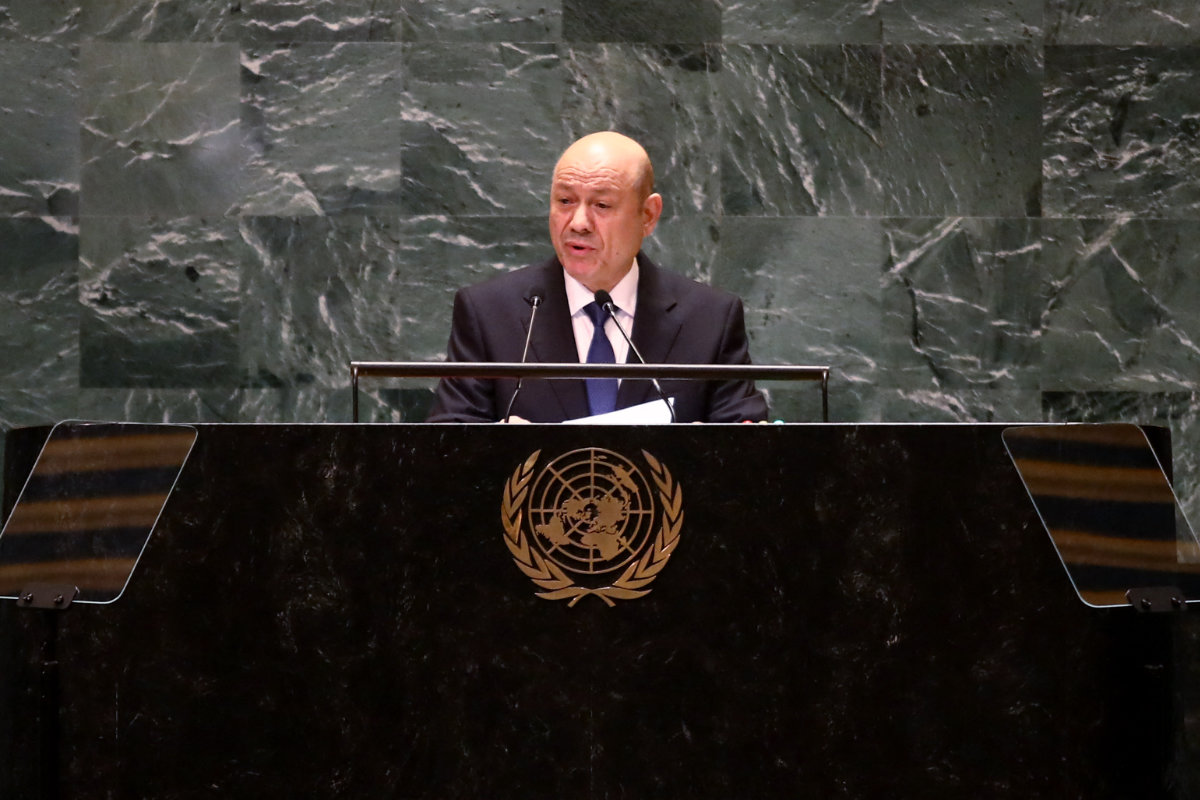
CaptionYemen’s President Rashad Mohammed Al-Alimi speaks during the 79th Session of the United Nations General Assembly in New York City on September 26, 2024. (AFP)
Lenderking said US officials were currently exploring opportunities for renewed progress on the Yemen peace track. They are engaged in a “broad conversation” with Yemeni leaders in New York City, including President Rashad Al-Alimi, as well as his vice presidents and foreign minister.
“We’ve had several meetings with him already,” said Lenderking, describing the Yemeni delegation as “strong.”
He added: “We just finished a meeting with nine countries that came to show their respect for the Yemeni government, to pledge their support and to encourage the Yemeni government to remain united, effective, visible, reaching out to the Yemeni people demonstrating that the government is there, is functioning well, and is trying to meet the needs of the people.”
Since the war began in Gaza last October, Yemen’s Houthi militia — which controls vast swaths of territory in the country including the capital, Sanaa — declared a blockade of all Israel-linked ships crossing the Red Sea.
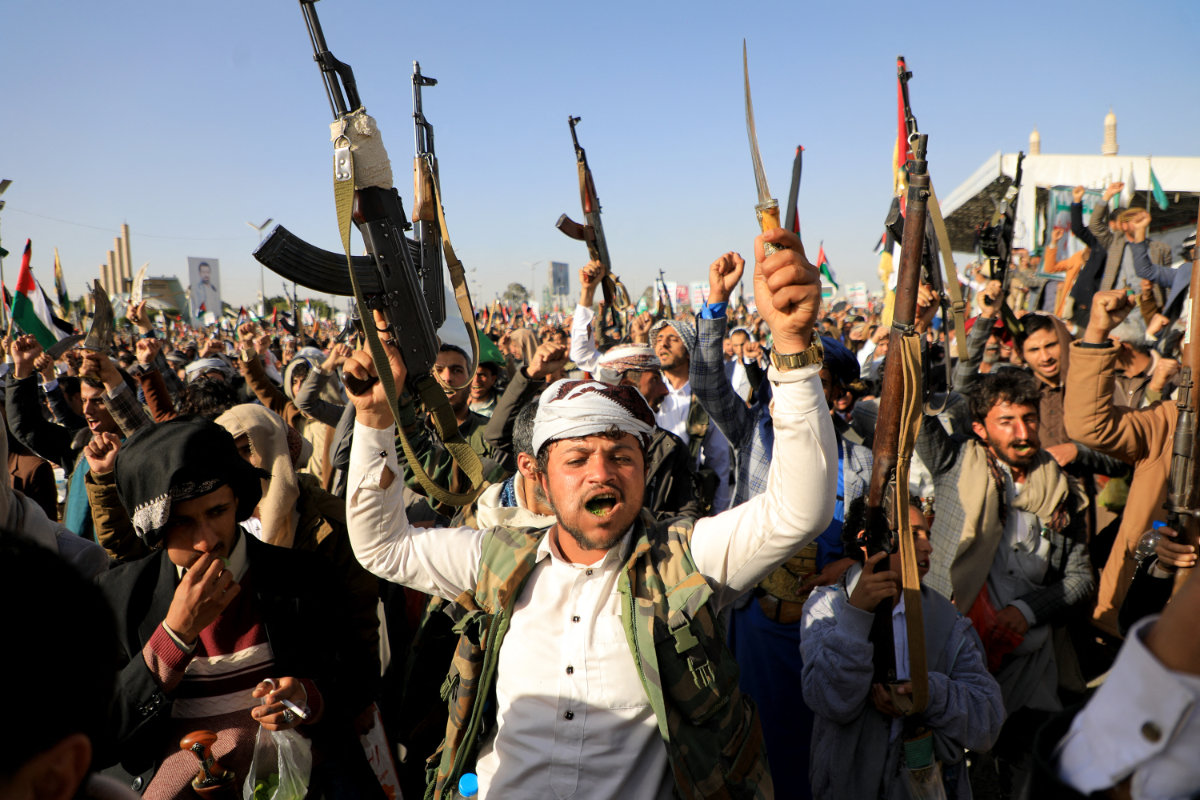
Houthi fighters protest in Sanaa on January 12, 2024 following US and British forces strikes in a bid to stop the militia's drone and missile attacks against commercial shipping on the Red Sea. (AFP)
The Iran-backed armed political and religious group views itself as a part of the Iranian-led “Axis of Resistance” against Israel, the US and the West.
It has threatened to continue its attacks on vessels until Israel ends its assault on Gaza. Since January, the UK and the US, in coalition with five other countries, have responded with retaliatory strikes against Houthi targets in Yemen.
The Oct. 7 Hamas-led attack on southern Israel and subsequent war in Gaza has had significant knock-on effects on Yemen, a country already reeling from nine years of war.
Publicized as a stand of defiance against Israel and a demonstration of solidarity with the Palestinian people, hundreds of attacks by the Houthis on commercial and military vessels in the strategic waterway have caused significant disruption to global trade.
Two vessels have been sunk.
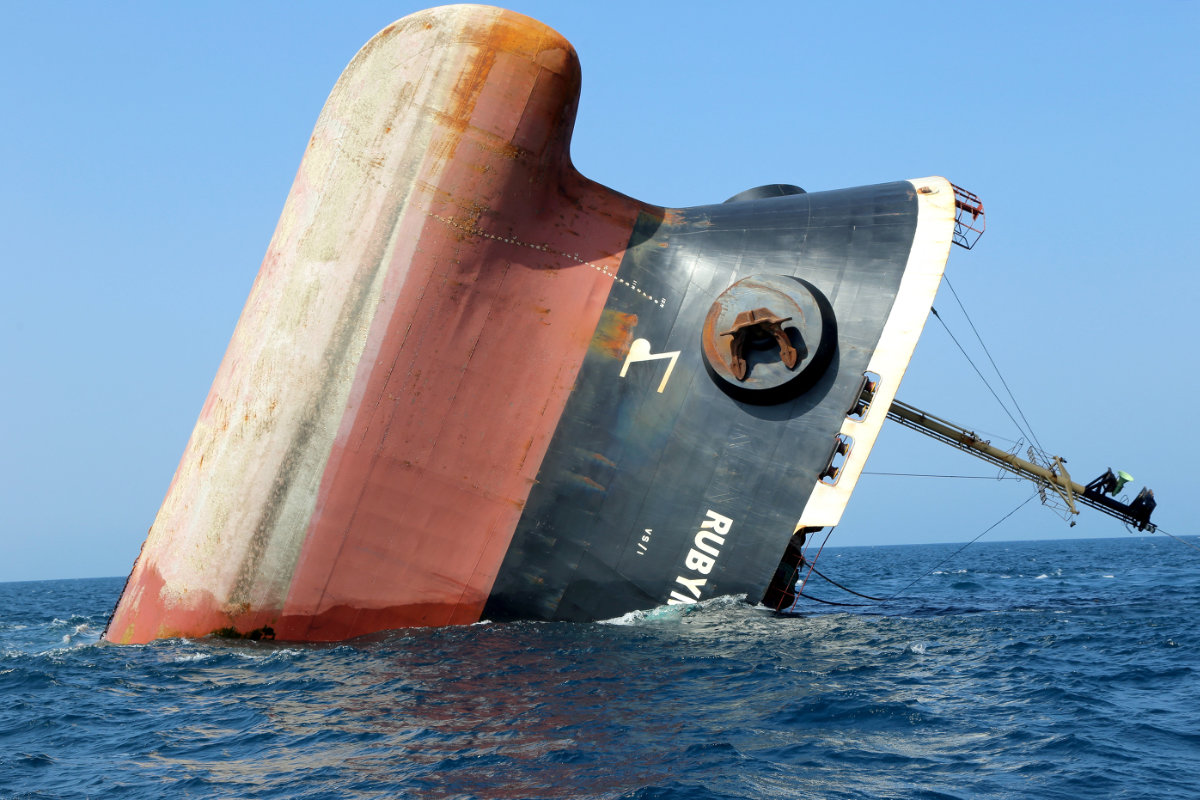
This picture taken on March 7, 2024 shows the Rubymar cargo ship partly submerged off the coast of Yemen after it was hit by a Houthi missile. (AFP/File)
Lenderking, however, believes the Houthi campaign is a “self-serving agenda” that is failing to help Gaza.
“The attacks on Red Sea shipping are actually hampering commercial goods and humanitarian supplies getting into Yemen, and they’re hurting regional economies,” he said. “So, we want to look at ways that we can de-escalate — that has been our central mission ever since Gaza.
“And it’s also to keep Yemen away from these broader regional conflicts that it could be dragged into. That would be very damaging for the hopes that we have for Yemen.”
The UN’s Yemen envoy, Hans Grundberg, told the Security Council earlier this month that the war in Gaza, and the regional escalation associated with it, is complicating his diplomatic efforts to move the peace process forward.
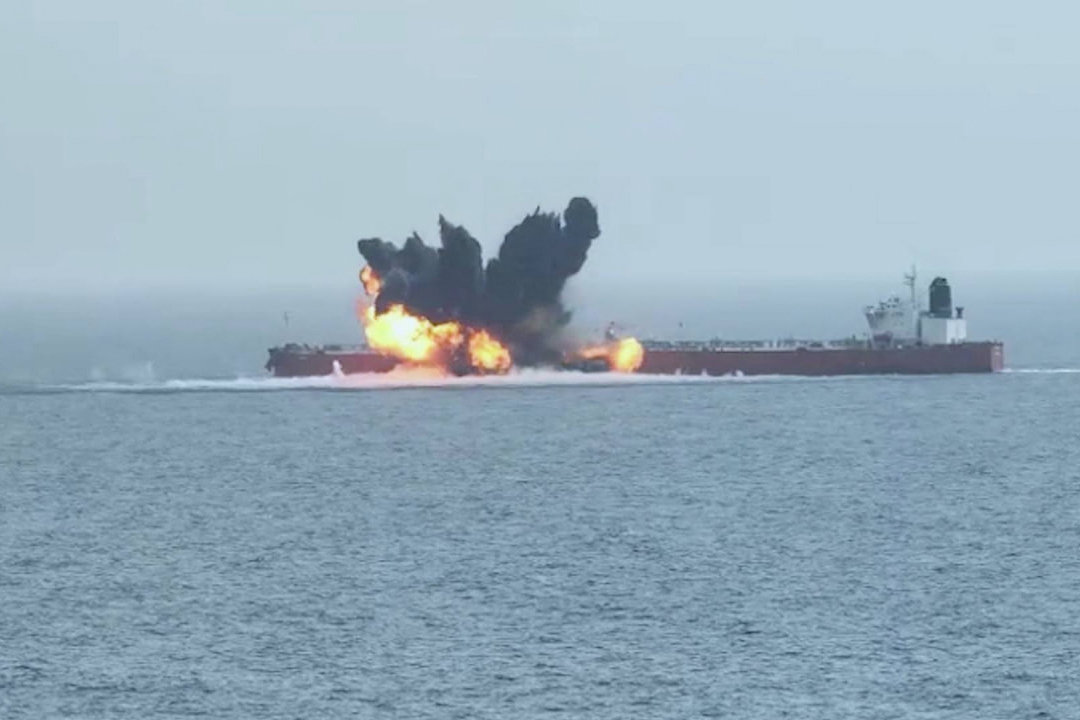
Explosion rocks the Chios Lion, a Liberia-flagged crude oil tanker, after it was hit by unmanned surface vessels in the Red Sea on July 15, 2024. (Ansarullah Media Center handout photo/Via AFP)
Lenderking conceded that separating the two conflicts was “very difficult.”
“But we have sought to do that, and we’ve put ideas on the table and made suggestions,” he said.
Part of that diplomatic push involved Saudi Arabia and Oman, who “have such a strong stake in the outcome of the conflict.”
“Those two countries want peace … and the Yemeni people, above all, I think they deserve peace after many years of bloodshed and destruction,” he said.
“So, there is a moment, still, where we can try to harness the goodwill, the energy of the international community, to support a peace effort in Yemen.”
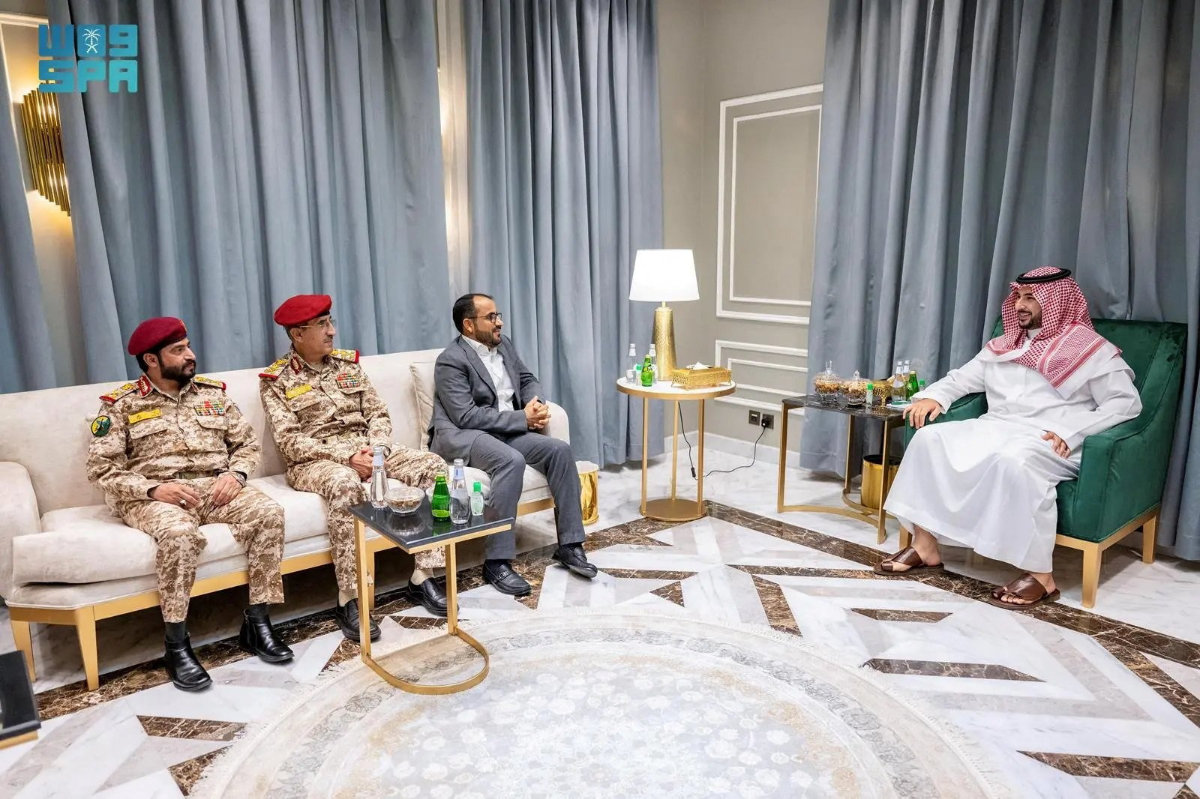
Saudi Defense Minister Prince Khalid bin Salman meeting with a Houthi delegation in Riyadh on Sept. 19, 2023. (SPA/File)
Aidarus Al-Zubaidi, leader of the Southern Transitional Council, a faction in the civil war opposed to the Houthis, warned this week that US and UK airstrikes on Yemen were causing a spike in popularity for the militia.
But Lenderking described any support for the Houthis as “fundamentally misguided.”
“If you look at their actual engagements and attacks, these are harmful to the Yemeni people, and they don’t help the Palestinian people,” he said.
“And that is the reality, and I think every country around the region knows that and sees the Houthi attacks as a self-serving agenda.
“So, we need to hear more voices from the region saying: ‘Wait a minute, what are the Houthis doing? Is it helping Yemen or is it hurting the prospects for more humanitarian assistance, and aid and development?’.”
The humanitarian situation in Yemen has also become markedly worse in recent months amid rising food insecurity, the spread of cholera and major flooding in sections of the country.
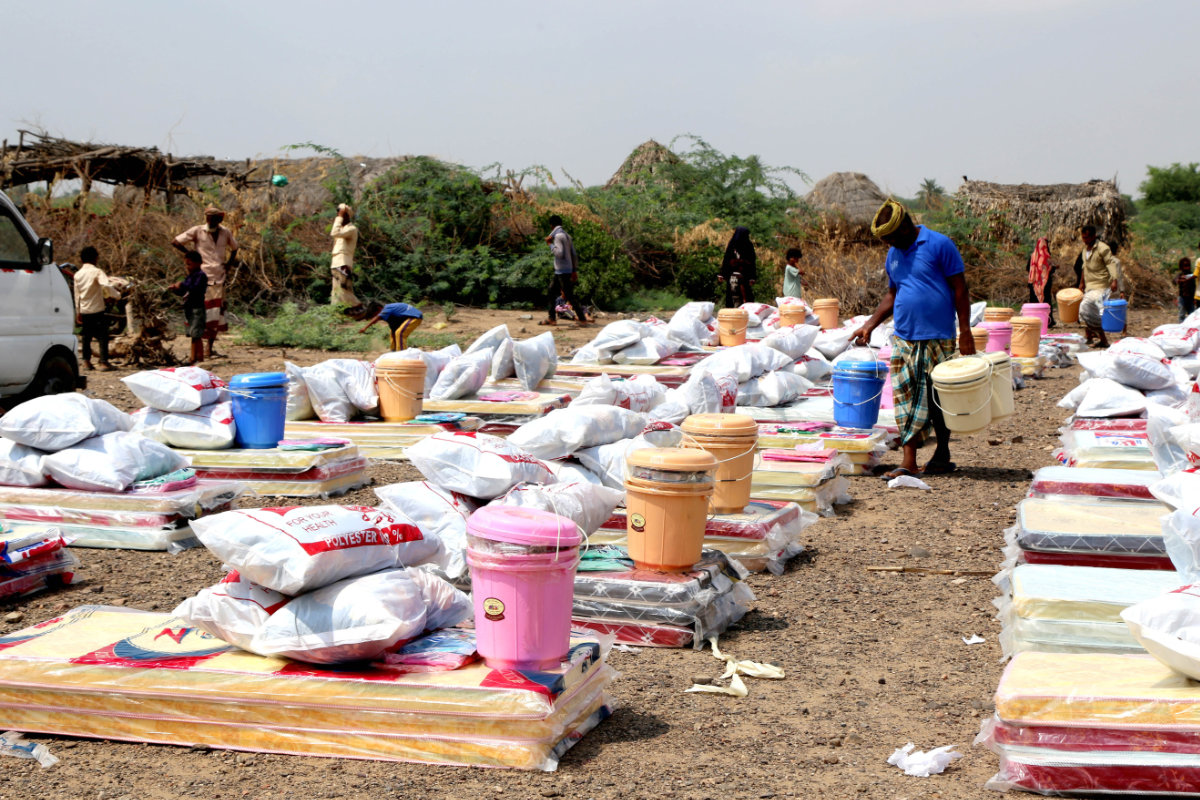
Displaced Yemenis affected by floods receive humanitarian aid in the Hays region on September 9, 2024. (AFP)
Efforts by the UN and its partners to respond to these crises have faced challenges stemming from a lack of funding and a shrinking humanitarian operating space.
In June, the Houthis detained 13 Yemeni national staff employed by UN agencies and more than 50 NGO and civil society organization employees who remain under detention.
Lenderking warned against “complicating the work of humanitarian people who are there to support the Yemeni people.”
At the UN General Assembly, Lenderking is also “trying to harness more international support for Yemen” from donors, who, he conceded, were facing “huge challenges and pressures from the terrible humanitarian situation in Gaza and Ukraine.”
“I feel that there’s much more that could be done,” he added.
“How do we keep Yemen in the focus and bringing resources to Yemen, bringing support to the Yemeni government, and having the tremendous energy that comes from the international community supporting this conflict? That’s what we’re trying to maintain and even build on.”
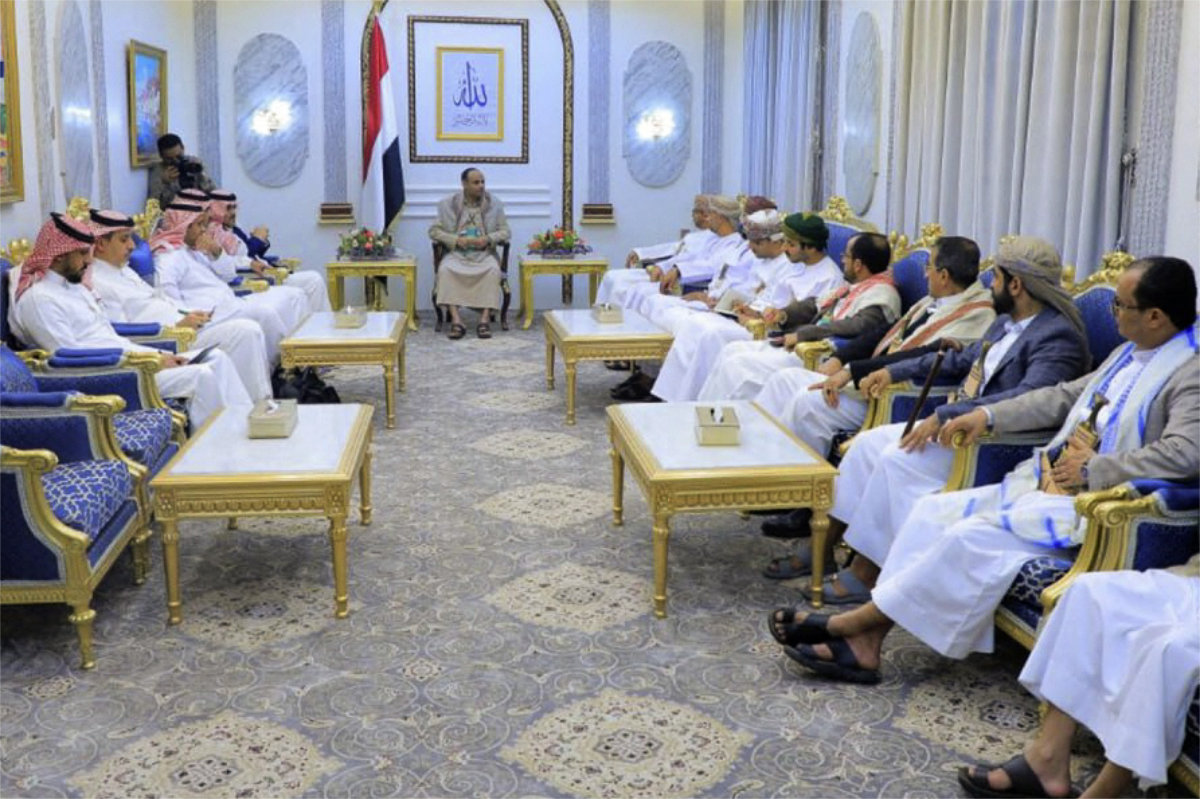
A handout picture released by the Houthi-affiliated branch of the Yemeni News Agency SABA on April 9, 2023, shows the militia's political leader Mahdi al-Mashat (C) meeting with delegations from Saudi Arabia and Oman in Sanaa. (SABA/AFP)
Iran’s sponsorship of the Houthis is causing headaches for those supporting the peace track.
Tehran publicly welcomed the truce in Yemen two years ago, but nonetheless continued the fueling and arming of the Houthis in violation of UN Security Council resolutions, said Lenderking.
Iran’s new president, Masoud Pezeshkian, signaled to world leaders on Tuesday that he wanted to open a “constructive” chapter in his country’s foreign policy.
“I aim to lay a strong foundation for my country’s entry into a new era, positioning it to play an effective and constructive role in the evolving global order,” said Pezeshkian.
But Lenderking has questions over the change in tone.
“I think people are looking forward to hearing what the Iranian leadership has to say about the state of tension in the region, and whether they are bringing anything new that can be constructive,” he said.
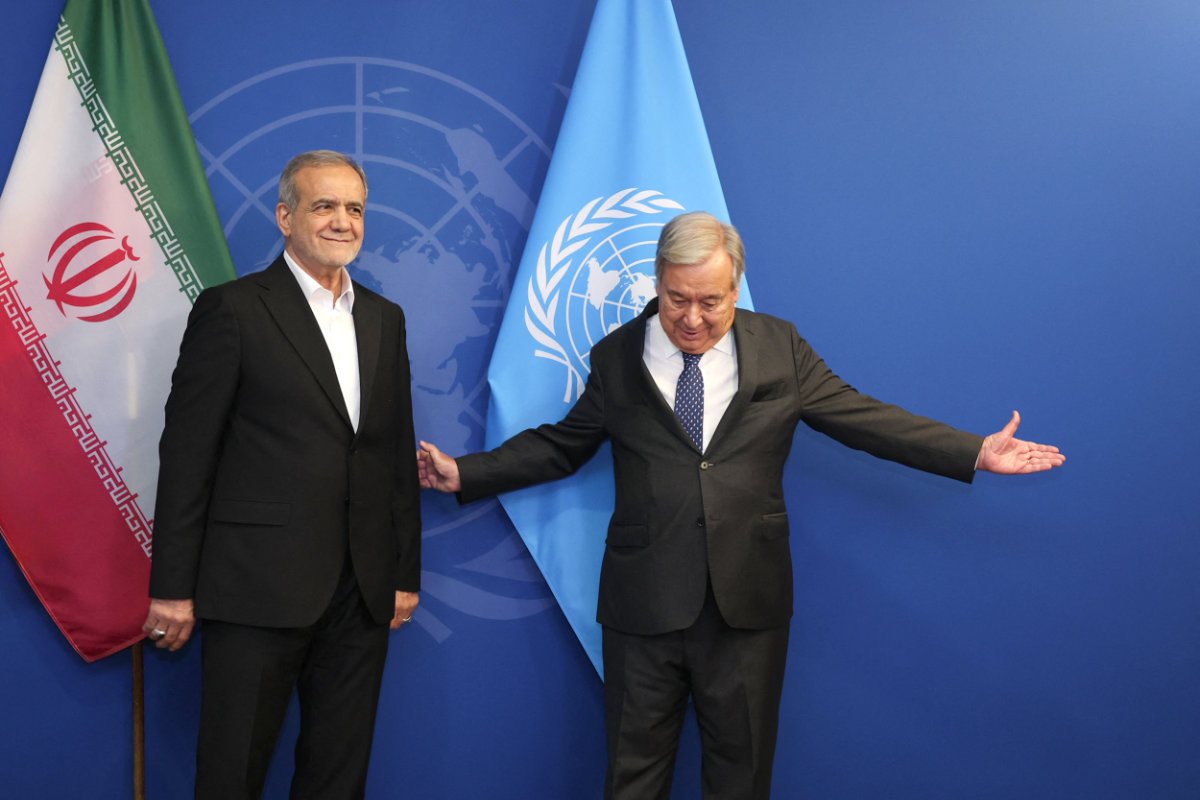
UN Secretary-General Antonio Guterres (right) welcomes Iran's President Masoud Pezeshkian ahead of their meeting at UN headquarters in New York on September 24, 2024. (Iranian Presidency handout photo/AFP)
“We’re hearing some flowery words and some nice words, but what are the Iranians actually committed to doing to de-escalate? Because I think that is the goal that we seek, and certainly in the case of Yemen, we’d like to see Iran play a constructive role. Let’s bring the temperature down and find a way to get back to a sustainable peace track in Yemen.”
Lenderking’s focus during the UN General Assembly has been to bring Yemen back into focus among policymakers and donors.
“There are some conflicts that are absolutely raging. We look at what’s happening in Gaza, and we look at problems and challenges in Sudan and elsewhere. Ukraine, of course.
“We’re here, my team, with regional support, to use this incredible platform here to remind people Yemen is a beautiful and rich country that wants to return to its position as a stable country and a stable neighbor.
“We can get there with strong support, and so reminding the international community of the importance of Yemen and not having Yemen dragged into a broader regional conflict is our key goal here.”
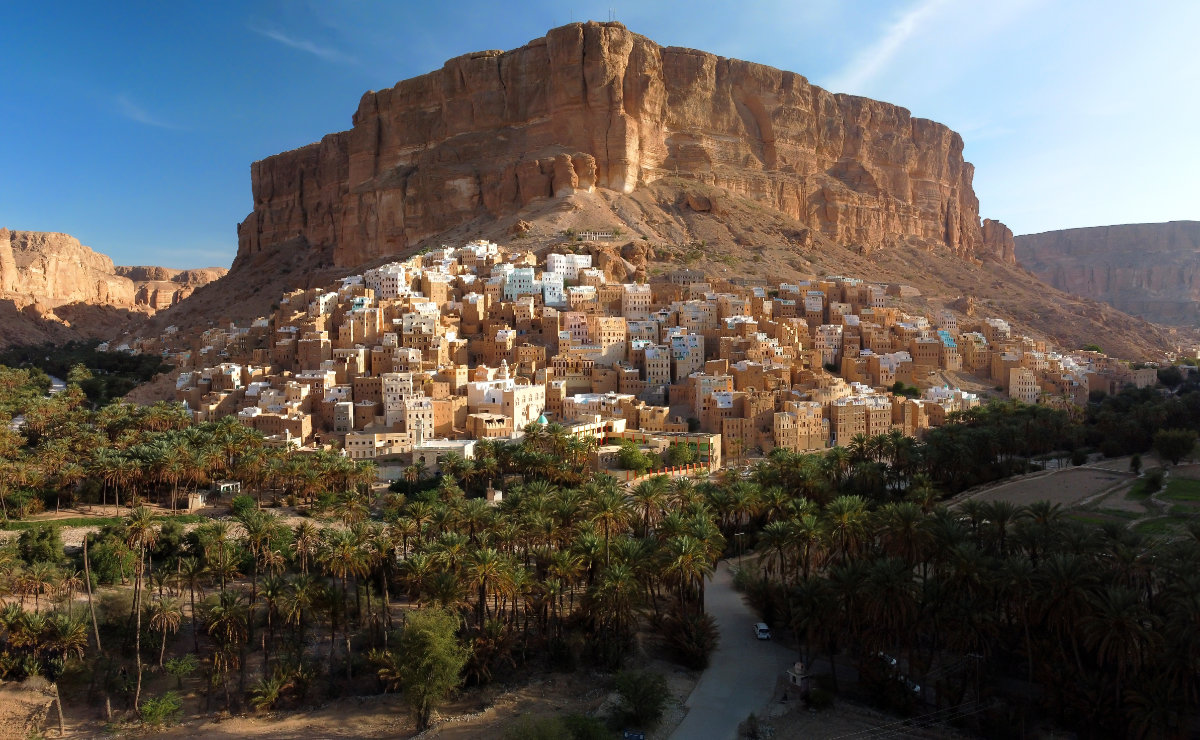
Al-Khuraybah, a town in Wadi Dawan region in Yemen's Hadhramaut governorate, is one of Yemen's treasures that have thankfully be spared by war. US special envoy Tim Lenderking says Yemen is a beautiful and rich country and the world ought to help return it to its position as a stable country and a stable neighbor. (Shutterstock photo)
What is at stake in Yemen was driven home this week at New York’s Metropolitan Museum of Art, where an exhibition was held for 14 Yemeni sculptures that were recently repatriated from a private donor in New Zealand.
Lenderking, who described the artworks as “incredible,” said the exhibition “symbolizes the unity of Yemen’s cultural heritage.”
He added: “Any Yemeni party could agree this is a country with cultural depth that has a beautiful legacy and incredible history and has been influential in the region in a very positive way.
“And wouldn’t it be great if we could work together so that Yemen can play that historical role and move out of the fires of war?”





























